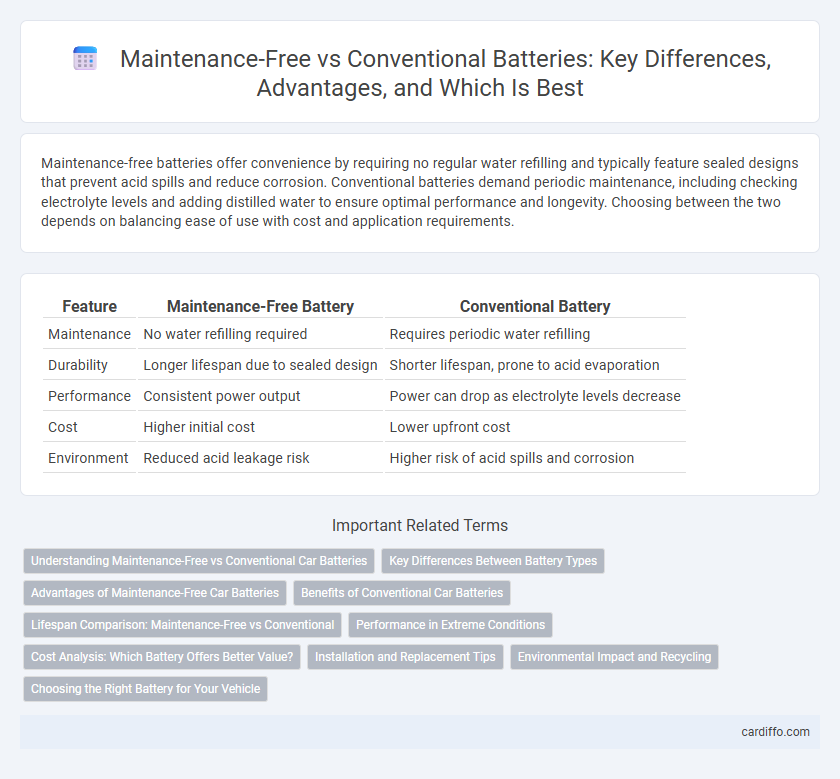Maintenance-free batteries offer convenience by requiring no regular water refilling and typically feature sealed designs that prevent acid spills and reduce corrosion. Conventional batteries demand periodic maintenance, including checking electrolyte levels and adding distilled water to ensure optimal performance and longevity. Choosing between the two depends on balancing ease of use with cost and application requirements.
Table of Comparison
| Feature | Maintenance-Free Battery | Conventional Battery |
|---|---|---|
| Maintenance | No water refilling required | Requires periodic water refilling |
| Durability | Longer lifespan due to sealed design | Shorter lifespan, prone to acid evaporation |
| Performance | Consistent power output | Power can drop as electrolyte levels decrease |
| Cost | Higher initial cost | Lower upfront cost |
| Environment | Reduced acid leakage risk | Higher risk of acid spills and corrosion |
Understanding Maintenance-Free vs Conventional Car Batteries
Maintenance-free car batteries feature sealed designs with immobilized electrolyte, eliminating the need for regular water refills and reducing the risk of acid spills. Conventional batteries require periodic maintenance, including checking electrolyte levels and topping up with distilled water to prevent sulfation and extend battery life. Understanding these differences helps vehicle owners choose the appropriate battery type based on convenience, cost, and longevity preferences.
Key Differences Between Battery Types
Maintenance-free batteries use sealed designs with absorbed electrolyte, reducing water loss and eliminating regular topping up, enhancing convenience and longevity. Conventional batteries require periodic maintenance, such as adding distilled water, to prevent electrolyte level drops and corrosion, increasing upkeep demands. The key difference lies in maintenance requirements, with maintenance-free batteries offering improved reliability and user-friendliness compared to conventional flooded lead-acid batteries.
Advantages of Maintenance-Free Car Batteries
Maintenance-free car batteries require no water refilling, reducing the risk of acid spills and minimizing routine upkeep, which enhances safety and convenience for vehicle owners. These batteries use advanced sealed designs and absorbent glass mat (AGM) technology, improving resistance to vibration and extending overall lifespan compared to conventional flooded batteries. High-performing maintenance-free batteries also deliver consistent power output in extreme temperatures, supporting reliable engine starts and optimal vehicle performance year-round.
Benefits of Conventional Car Batteries
Conventional car batteries offer reliable performance and cost-effectiveness, making them a popular choice for budget-conscious vehicle owners. They allow easy access for checking electrolyte levels and performing periodic maintenance, which can extend battery lifespan when properly cared for. Their robust design provides consistent power output, especially in extreme temperatures or demanding driving conditions.
Lifespan Comparison: Maintenance-Free vs Conventional
Maintenance-free batteries typically offer a longer lifespan compared to conventional batteries due to advanced sealed designs that prevent electrolyte loss and reduce corrosion. Conventional batteries often require regular maintenance such as water refilling, which if neglected, can shorten their operational life. Studies show maintenance-free batteries can last up to 20-30% longer under similar usage conditions, making them a cost-effective choice for long-term performance.
Performance in Extreme Conditions
Maintenance-free batteries maintain stable performance under extreme temperatures due to sealed construction that prevents electrolyte loss, ensuring consistent power output during harsh cold or heat. Conventional batteries may suffer reduced efficiency and shorter lifespan in extreme conditions because of electrolyte evaporation and increased risk of corrosion. High-performance applications often favor maintenance-free batteries for their reliability and durability in demanding environments.
Cost Analysis: Which Battery Offers Better Value?
Maintenance-free batteries typically offer better long-term value due to lower upkeep costs and longer lifespan compared to conventional batteries, which require periodic water refilling and regular inspections. While conventional batteries have a lower initial purchase price, their maintenance demands often lead to higher overall expenses over time. Evaluating total cost of ownership including maintenance, replacement frequency, and performance efficiency clearly positions maintenance-free batteries as the more cost-effective option for most users.
Installation and Replacement Tips
Maintenance-free batteries require less frequent checks, but correct installation is crucial to prevent corrosion and ensure optimal performance; use proper terminal cleaner and tighten connections securely. Conventional batteries need regular electrolyte level monitoring and may require distilled water replenishment; during replacement, ensure the correct orientation to avoid damaging the vehicle's electrical system. Always disconnect the negative terminal first and reconnect it last to minimize the risk of short circuits during battery installation or replacement.
Environmental Impact and Recycling
Maintenance-free batteries reduce environmental impact by minimizing electrolyte leakage and requiring less frequent replacement, leading to decreased hazardous waste. Conventional batteries often contain higher levels of lead and corrosive acids that pose significant recycling challenges and environmental risks if improperly disposed of. Effective recycling programs for both types are critical to recovering valuable materials and preventing soil and water contamination.
Choosing the Right Battery for Your Vehicle
Maintenance-free batteries offer sealed designs that minimize water loss and eliminate the need for regular electrolyte checks, making them ideal for low-maintenance vehicle owners. Conventional batteries require periodic topping up with distilled water and more frequent inspections but typically come at a lower initial cost, suiting budget-conscious drivers or older vehicles. Assessing factors like vehicle type, climate conditions, and budget constraints helps determine whether a maintenance-free or conventional battery is the right fit for optimal performance and longevity.
Maintenance-Free vs Conventional Infographic

 cardiffo.com
cardiffo.com